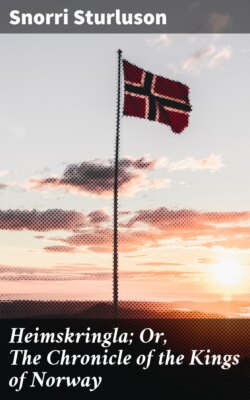Читать книгу Heimskringla; Or, The Chronicle of the Kings of Norway - Snorri Sturluson - Страница 37
На сайте Литреса книга снята с продажи.
19. BATTLE IN HAFERSFJORD.
ОглавлениеTable of Contents
News came in from the south land that the people of Hordaland and Rogaland, Agder and Thelemark, were gathering, and bringing together ships and weapons, and a great body of men. The leaders of this were Eirik king of Hordaland; Sulke king of Rogaland, and his brother Earl Sote: Kjotve the Rich, king of Agder, and his son Thor Haklang; and from Thelemark two brothers, Hroald Hryg and Had the Hard. Now when Harald got certain news of this, he assembled his forces, set his ships on the water, made himself ready with his men, and set out southwards along the coast, gathering many people from every district. King Eirik heard of this when he same south of Stad; and having assembled all the men he could expect, he proceeded southwards to meet the force which he knew was coming to his help from the east. The whole met together north of Jadar, and went into Hafersfjord, where King Harald was waiting with his forces. A great battle began, which was both hard and long; but at last King Harald gained the day. There King Eirik fell, and King Sulke, with his brother Earl Sote. Thor Haklang, who was a great berserk, had laid his ship against King Harald's, and there was above all measure a desperate attack, until Thor Haklang fell, and his whole ship was cleared of men. Then King Kjotve fled to a little isle outside, on which there was a good place of strength. Thereafter all his men fled, some to their ships, some up to the land; and the latter ran southwards over the country of Jadar. So says Hornklofe, viz.:—
"Has the news reached you?—have you heard
Of the great fight at Hafersfjord,
Between our noble king brave Harald
And King Kjotve rich in gold?
The foeman came from out the East,
Keen for the fray as for a feast.
A gallant sight it was to see
Their fleet sweep o'er the dark-blue sea:
Each war-ship, with its threatening throat
Of dragon fierce or ravenous brute (1)
Grim gaping from the prow; its wales
Glittering with burnished shields, (2) like scales
Its crew of udal men of war,
Whose snow-white targets shone from far
And many a mailed spearman stout
From the West countries round about,
English and Scotch, a foreign host,
And swordamen from the far French coast.
And as the foemen's ships drew near,
The dreadful din you well might hear
Savage berserks roaring mad,
And champions fierce in wolf-skins clad, (3)
Howling like wolves; and clanking jar
Of many a mail-clad man of war.
Thus the foe came; but our brave king
Taught them to fly as fast again.
For when he saw their force come o'er,
He launched his war-ships from the shore.
On the deep sea he launched his fleet
And boldly rowed the foe to meet.
Fierce was the shock, and loud the clang
Of shields, until the fierce Haklang,
The foeman's famous berserk, fell.
Then from our men burst forth the yell
Of victory, and the King of Gold
Could not withstand our Harald bold,
But fled before his flaky locks
For shelter to the island rocks.
All in the bottom of the ships
The wounded lay, in ghastly heaps;
Backs up and faces down they lay
Under the row-seats stowed away;
And many a warrior's shield, I ween
Might on the warrior's back be seen,
To shield him as he fled amain
From the fierce stone-storm's pelting rain.
The mountain-folk, as I've heard say,
Ne'er stopped as they ran from the fray,
Till they had crossed the Jadar sea,
And reached their homes—so keen each soul
To drown his fright in the mead bowl."
ENDNOTES: (1) The war-ships were called dragons, from being decorated
with the head of a dragon, serpent, or other wild animal; and the
word "draco" was adopted in the Latin of the Middle Ages to
denote a ship of war of the larger class. The snekke was
the cutter or smaller war-ship.—L.
(2) The shields were hung over the side-rails of the ships.—L.
(3) The wolf-skin pelts were nearly as good as armour against
the sword.
